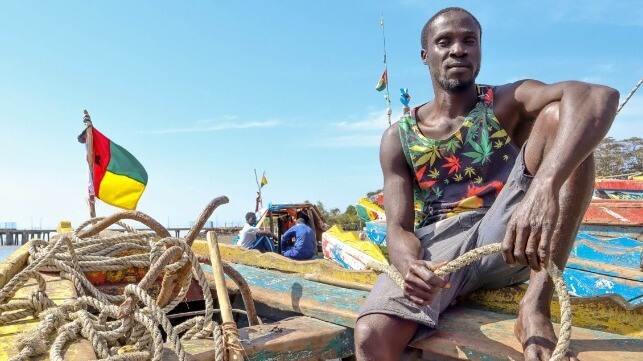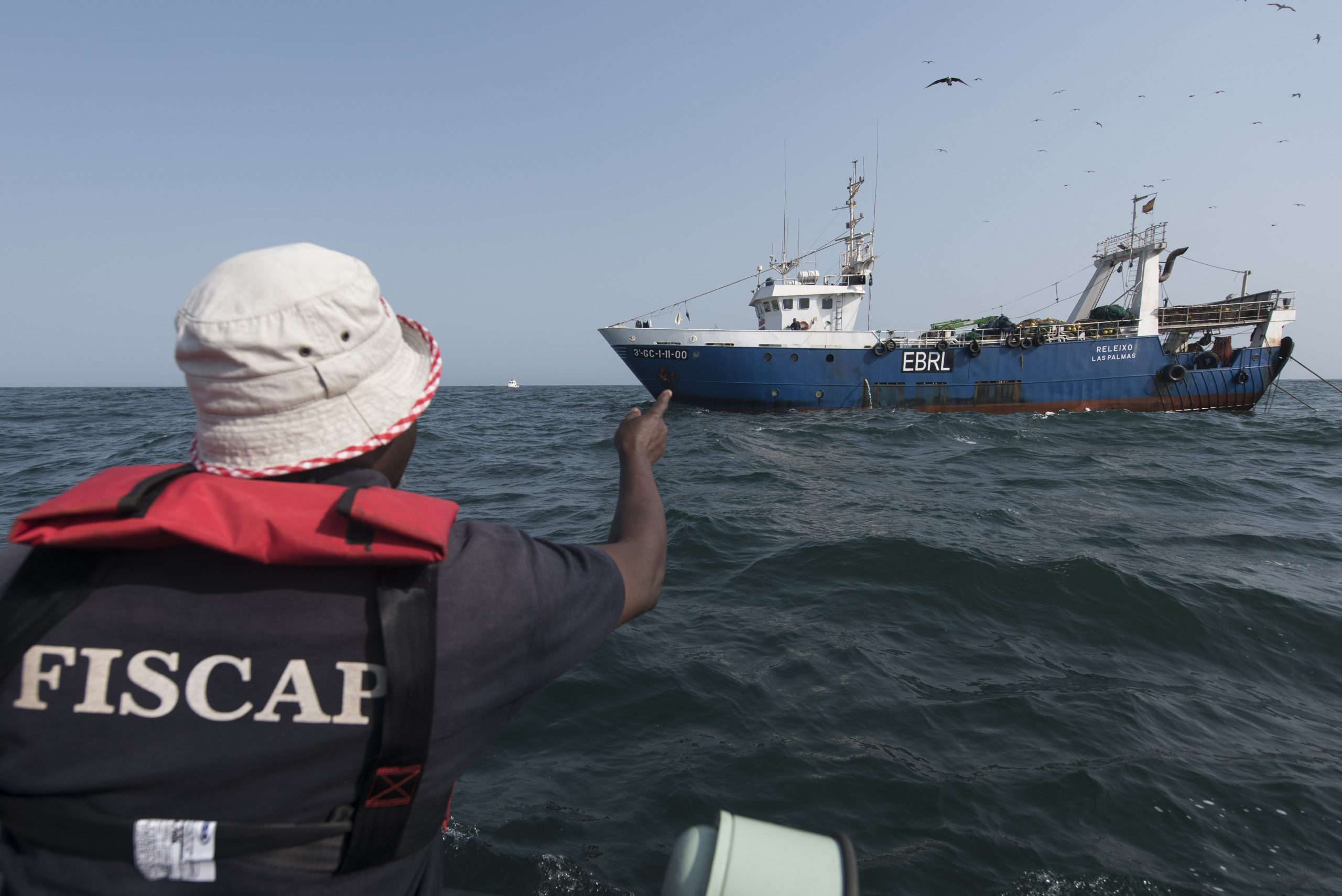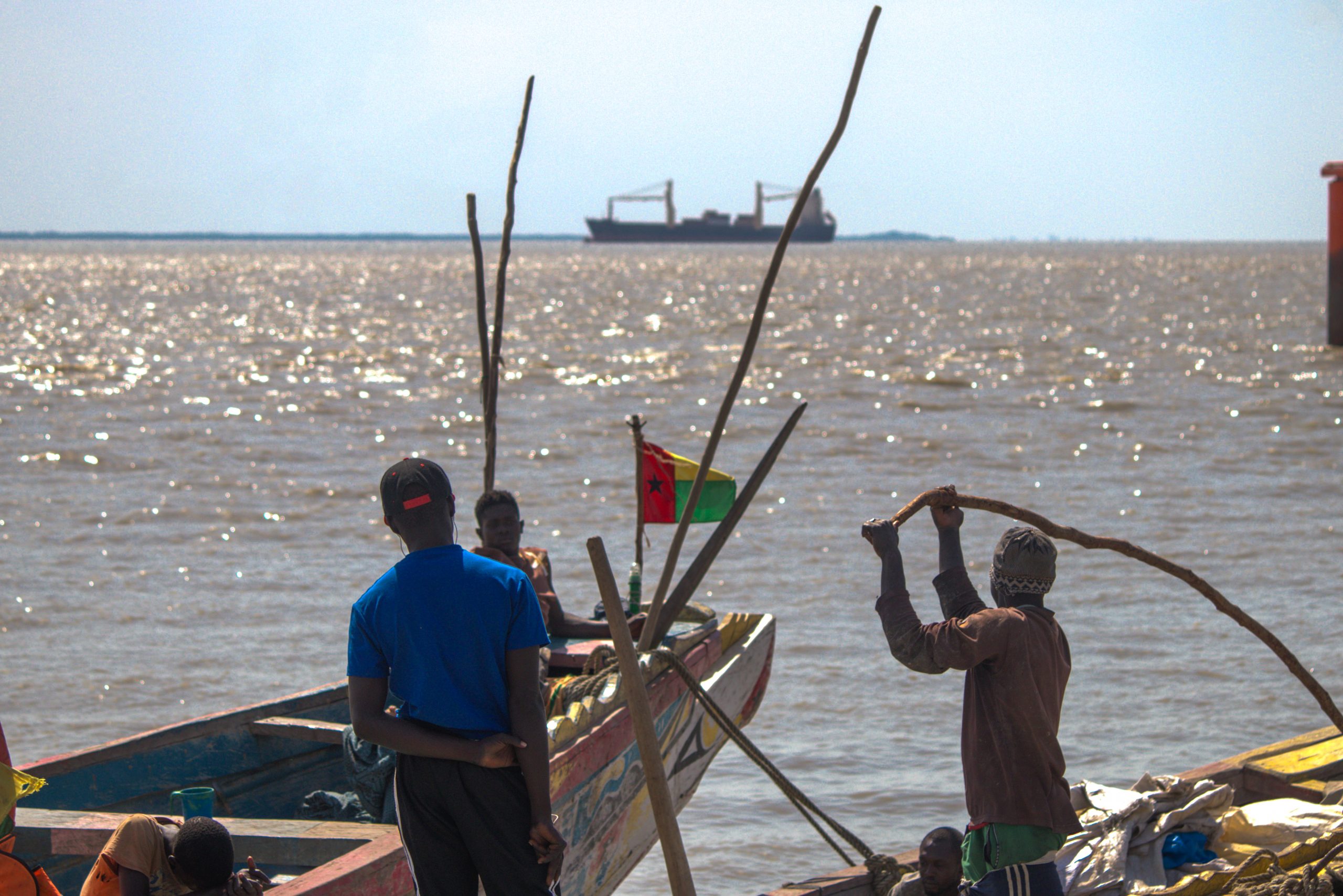Illegal Industrial Fishing Reduces Food Supply in Guinea-Bissau

Guinea-Bissau, one of Africa’s poorest countries, is afflicted by chronic malnutrition that is affecting one quarter of its 1.8 million population, according to the World Food Programme.
Fisheries offer an important way for the country to improve this situation. Guinea-Bissau’s exclusive economic zone, which stretches 200 nautical miles out from its coastline, covers 106,000km2 and some of West Africa’s most abundant fishing grounds, according to a 2017 paper published in Frontiers in Marine Science.
Small-scale fishing provides over 35% of citizens’ animal protein intake and employs more than 255,000 people, the paper notes. But much of the economic and nutritional potential of the country’s fisheries are threatened by illegal, unreported and unregulated (IUU) fishing.
The paper puts the annual landed value of Guinea-Bissau’s fisheries at US$416 million, before explaining that more than half of this ($260.7 million) is captured by illegal and unreported methods. Of the remaining landed value, only 31% is claimed by the local economy, through fishing fees and agreements.
To curb illegal fishing, Guinea-Bissau cooperates with its neighbours via regional agreements. But capacity problems and corruption among officials are hindering the country’s attempts to police fishing in its waters.
Fishers note declining catches
It is early morning at Porto de Bandim in the national capital, Bissau. Mario Boris Fernandez has just returned from an overnight trip. “Two decades ago, when I started fishing here, our catches were so plentiful that I could take care of feeding, clothing and other social issues of my family, without any difficulty,” the 39-year-old told China Dialogue. “It’s now proving difficult to get the quantity and quality of fish we used to have.”
In the nearby fish market, women and men buy and sell fish for eating at home. Most complain that costs continue to increase.
Fatou Sanneh, a fishmonger, says: “This is all that I do to support my husband in taking care of the family. I have been selling fish in this market for close to 15 years. I can recall the time when we would pick which type of fish to buy from the fishermen because the supply was enough. The fish business was profitable.”
Trawlers ‘destroying the ocean’
Kebba Badji, another Porto de Bandim fisher, claims trawlers are encroaching into waters designated for small-scale fishing: “They will catch all types of fish and then collect what they want and throw the rest of the dead fish into the sea. That is destroying the ocean.”
Industrial fishing in Guinea-Bissau is carried out by foreign vessels chartered or reflagged to the country. According to the Frontiers in Marine Science paper, such catches are generally landed elsewhere, notably in the Canary Islands and Senegal. Badji says it is painful to watch foreign fleets compete for Guinea-Bissau’s fish: “They should have a limit. This is unsustainable.”
The paper estimates that, in 2017, legal catch by industrial vessels amounted to 280,620 tonnes, while their illegal catch was 62,000 tonnes. Meanwhile, small-scale catches – comprising artisanal, subsistence and recreational fishing – fell from 44,700 tonnes in 2013 to around 27,800 tonnes.
The Institute for Security Studies, a policy think-tank headquartered in South Africa, has also been surveying this issue. In November 2021, it reported that illegal fishing, especially by industrial-scale operators, must be curbed for West African nations to fairly benefit from their own waters.
 Guinean-Bissau fishery inspectors approach a trawler registered in the Canary Islands, 2017 (Image: © Pierre Gleizes / Greenpeace)
Guinean-Bissau fishery inspectors approach a trawler registered in the Canary Islands, 2017 (Image: © Pierre Gleizes / Greenpeace)
A Greenpeace report on West African fisheries, also published in 2017, states that approximately 177 industrial fishing vessels were working Guinea-Bissau’s waters during March of that year. These vessels flew the flags of either China, France, Spain, Comoros, Panama, Senegal, Portugal, Greece, South Korea, Guinea Conakry, Curaçao, Cabo Verde, Guatemala or Belize. Together with Guinea-Bissau’s fisheries inspection unit (FISCAP), Greenpeace spent four days surveilling the country’s waters and boarded six vessels. Of these six embarkations, four led to the arrest of crew members. The team encountered 82 vessels in total, 42 of which were not broadcasting AIS (automatic identification system) information, potentially a sign of an attempt to conceal locations and activities.
A bad deal for artisanal fishers
According to Fernandez, artisanal fishers bear the brunt of industrial fishing. This is because it takes place not only in Porto de Bandim’s further-out waters, but also in a band of water reserved for small-scale fishers that stretches 12 nautical miles from the shore. He believes that the government should increase the protection and supervision of industrial trawlers to avoid further damage to Guinea-Bissau’s ocean and blue economy.
The local women, who mainly work as fishmongers, have been hit equally hard. Fishmonger Fatou Sanneh told China Dialogue: “I buy a kilo of fish for 350 CFA [$0.58] and get 50 CFA profits, which is a very bad deal. The supply we used to get whenever the fishermen landed has gone down, leading to higher costs for fish. The high cost has compelled us to increase the price for consumers, hence affecting business.”
The United Nations Development Programme is assisting Guinea-Bissau’s government in shaping a “national blue economy strategy” and corresponding investment plan. According to Mussa Sambi, director-general of the Economy Directorate of Guinea-Bissau’s economics ministry, any plans to combat poverty with economic growth “must be sustainable.”
Until an appropriate strategy is effectively implemented, overfishing and illegal fishing will continue to reduce fish populations and catch numbers for local people.
Weak regulations complicate the IUU fight
Fighting IUU fishing is particularly difficult in Guinea-Bissau due to shortcomings in the justice system.
The general fisheries law has a sliding scale of fines for fishing offences: very serious offences, like fishing in prohibited zones, carry a maximum fine of 250 million CFA ($420,000); less serious infractions, such as failure to cooperate with monitoring personnel, result in a minimum fine of 1.5 million CFA ($2,500).
Domingos Quade, a lawyer and politician from Guinea-Bissau, says these lighter fines are too easily paid by fleet owners and the existing laws should be strengthened: “For example, the law should be clear in defining limitations for the fishing boats, the type of nets to be used, how to use them – and laws should be enforced.”
The legal framework that regulates fishing in Guinea-Bissau’s waters is lacking in several aspects, according to a 2022 report by the UN Food and Agriculture Organization (FAO). The report says the law is not regularly reviewed or updated, making it insufficient for supervising fishing or effectively managing fish populations.
Stronger governance and monitoring needed
Guinea-Bissau’s general fisheries law empowers FISCAP to monitor vessels operating in waters under national jurisdiction. This is particularly necessary in West Africa where illegal fishing is pervasive. In fact, it costs Guinea-Bissau and its west coast neighbours Mauritania, Senegal, The Gambia, Guinea and Sierra Leone a combined $2.3 billion every year. These countries have weak systems for monitoring and controlling fishing, which exposes Guinea-Bissau’s exclusive economic zone to illegal fishing by both pirates and legally registered vessels.
 Local small-scale fishers often cannot compete with larger industrial fishing vessels (Image: Aliu Embalo / China Dialogue Ocean)
Local small-scale fishers often cannot compete with larger industrial fishing vessels (Image: Aliu Embalo / China Dialogue Ocean)
China Dialogue spoke to Lourenco Antonio Vaz, Guinea-Bissau’s deputy environment minister: “These fleets are more sophisticated than our capacity and this makes it more challenging for us to get them the way we should do.” Moreover, Vaz says the government’s fuel supplies for ocean patrolling are inadequate, as are its efforts to coordinate information-sharing among stakeholders.
Meanwhile, this government has created a special unit to monitor and prevent IUU fishing: the Institute of Biodiversity in Protected Areas (IBAP). Its coordinator is Joao Sousa Cordeiro, who admits that IBAP has capacity issues. “The agents who do the monitoring are civilians and they should work with the maritime guards, but this is not happening,” Cordeiro explains. He says accessing adequate, consistent supplies of fuel is “a challenge”.
Cordeiro reveals that even though IBAP is a government department, it does not receive any financial subventions from the government, forcing it to rely solely on project funding. “As we speak, we are not functioning because our projects phased out,” he says. “We are not currently monitoring illegal fishing due to lack of finance.”
Regional cooperation gives hope
As described in the FAO report, Guinea-Bissau’s general fisheries law establishes the principle of cooperating with other states and organisations to co-manage transnational fish populations. Indeed, Vaz says the government views regional cooperation as the main solution to this crisis. It has so far been working with Cabo Verde’s coast guards, but Vaz concedes that such cooperation must be extended to more neighbouring states for greater impact.
Guinea-Bissau is also a member of the Sub-Regional Fisheries Commission (SRFC), along with Cabo Verde, The Gambia, Guinea, Mauritania, Senegal and Sierra Leone. Since its establishment in 1985, the SRFC has created several protocols and conventions to help protect marine resources.
Nevertheless, a lack of regional information-sharing has increased the risk of illegal fishing. For example, the Frontiers in Marine Science paper found that many of the industrial vessels authorised to operate in Guinea-Bissau in 2017 had a criminal or IUU record.
Moreover – and as the FAO legal report points out – there are three particularly important UN agreements to which Guinea-Bissau is not yet signed up to: the FAO Compliance Agreement, the UN Fish Stocks Agreement and the Port State Measures Agreement.
Corruption claims against agents and officials
According to a 2017 report by the advocacy group Transparency International, corruption is perceived to be widespread in Guinea-Bissau. For example, Quade notes that the agents assigned to monitor and report IUU fishing crimes have not been forthcoming with information.
Even Cordeiro, the coordinator of a governmental unit, admits that corruption is prevalent among state officials, especially regarding fishing trawlers: “When they are caught, some senior government officials would intervene by taking bribes. This phenomenon makes it tough for us.”
Cordeiro believes the solution lies in tougher penalties. “We should increase the fines because those engaging in illegal fishing activities have money and are well-connected to high-ranking officials, including ministers, and they end up being freed,” he says.
Ultimately, people do not trust the judicial system to deliver environmental justice, concludes Cordeiro: “They are seen by many as corrupt people who can easily be bribed. It is costing us a lot and we do not have data to be able to estimate the economic loss illegal fishing is causing to our economy. But in any case, I can confirm to you that those engaging in it are the winner in Bissau’s fishing industry.”

that matters most
Get the latest maritime news delivered to your inbox daily.
Guinea-Bissau’s minister of fisheries, Orlando Mendes Viegas, did not respond to China Dialogue’s requests for comment.
Kebba Jeffang is West Africa regional editor for China Dialogue. He is based in the Gambia.
The opinions expressed herein are the author's and not necessarily those of The Maritime Executive.
